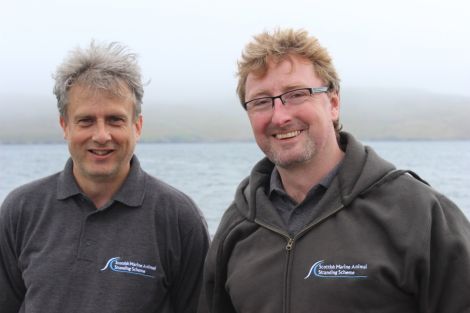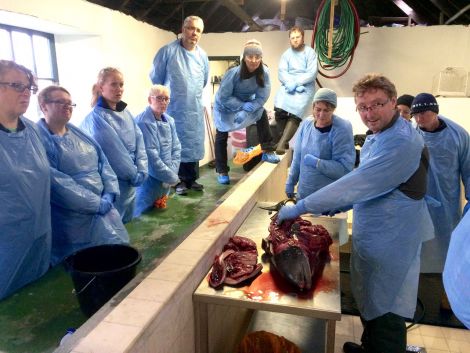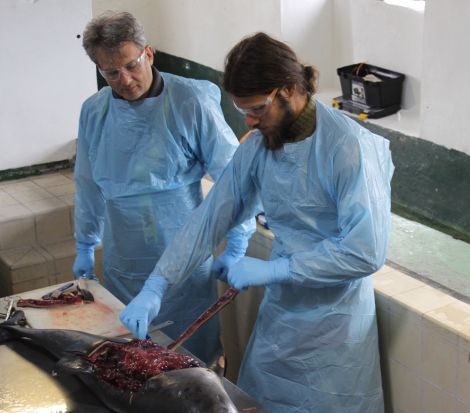News / Volunteers flock to help strandings scheme
AROUND 25 environmental enthusiasts from around Shetland have signed up as citizen scientists to help monitor the health of the ocean after two days of workshops run by the Scottish Marine Animal Stranding Scheme (SMASS).
Andrew Brownlow and Nick Davison, who travelled north to run the workshops at Hillswick Wildlife Sanctuary, said they were delighted with the response from islanders.
SMASS is keen to develop a large network of volunteers around Scotland to help them monitor and examine stranded whales, dolphins, seals, basking sharks and turtles.
Some specimens will be collected and sent to their base in Inverness for post mortem, while most will simply provide samples for analysis and to archive.
During the workshops the pair explained the best way to find out about the health of species that spend their entire lives out at sea is by studying them after they land ashore.
SMASS are keen to build on the huge database of information they have collected from thousands of animals found on Scotland’s coastline since they started in 1992.
Shetland is an important part of their territory due to its remoteness and range of species, but until now there has been a shortage of people trained to take samples.
Over the course of two days, volunteers heard about the scheme’s background before practising how to measure and take skin, blubber, muscle and tooth samples from two dead porpoises that had been flown up from Inverness for the occasion.
Each day ended with Brownlow and Davison carrying out an autopsy on a porpoise to establish its cause of death – one had died from hunger, while the other had been attacked by a bottle-nosed dolphin, a surprisingly frequent occurrence.
“This course allows people to realise the value of investigating dead animals in helping us understand what is going on out at sea,” Brownlow said.
Become a supporter of Shetland News
Seals and cetaceans act as environmental “sentinels” because they are at the very top of the food chain, he said.
“You can look at the level of toxins and contaminants in mud or shellfish, but if you are interested in how this accumulates up the food web you will see it in these animals.”
Orcas, which can live up to 90 years old, are some of the planet’s most contaminated animals having built up toxins like PCBs (polychlorinated biphenyls) that affect their immune and reproductive systems, he said.
This level of contamination has caused orca populations in the Western Isles and the Mediterranean to stop reproducing altogether, which is why there is such excitement at the sight of young orca calves swimming amongst the pods around Shetland this summer.
“Having young killer whales here is hugely significant. The fact they are reproducing is very good news on loads of different levels,” Brownlow said, especially as environmental toxins tend to accumulate in northern waters.
More good news is the gradual recovery of the great whales following the international ban on whaling in 1986, but the marine environment continues to be in “a fragile state”, he said.
“We have used the oceans poorly and we are using them poorly, but I think we are becoming a little more aware.”
Information gathered by SMASS has observed changes in population dynamics around Scotland, for example an increase in striped dolphins and a decline in white-sided dolphins.
It has also thrown up warnings about the threat creel ropes pose to humpback whales and the risk that dredging stirs up buried toxins and releases them back into the environment.
Meanwhile SMASS continue to recruit as many volunteers as possible to help them build a more complete picture of the marine environment, with more workshops planned for the future.
Davison said: “We’re really pleased with the response we’ve had in Shetland. It’s one of the best, if not the best response to any of our pleas for help in Scotland.”
But he added they were certain there was under reporting of strandings in the isles, especially of seals, and are keen to have more people on the ground reporting what they find.
“We know the diversity of species you have in Shetland, and we know that it’s not unusual to see a dead animal on a beach. While it might not be unusual for people here, that information really helps us get a better handle on what is going on out there. It’s citizen science at its best.”
Karen Hall, marine mammal adviser with Scottish Natural Heritage in Lerwick, added: “It’s been great to see so many people interested in coming to these workshops.
“What it means at the end of the day is lots of eyes out monitoring what is going on and more sources of information coming in.”
Jan Bevington, from Hillswick Wildlife Sanctuary, said: “Andrew and Nick were very generous with the wealth of information they shared with us and we look forward to cooperating with them in the future.”
Become a supporter of Shetland News
Shetland News is asking its many readers to consider start paying for their dose of the latest local news delivered straight to their PC, tablet or mobile phone.
Journalism comes at a price and because that price is not being paid in today’s rapidly changing media world, most publishers - national and local - struggle financially despite very healthy audience figures.
Most online publishers have started charging for access to their websites, others have chosen a different route. Shetland News currently has over 600 supporters who are all making small voluntary financial contributions. All funds go towards covering our cost and improving the service further.
Your contribution will ensure Shetland News can: -
- Bring you the headlines as they happen;
- Stay editorially independent;
- Give a voice to the community;
- Grow site traffic further;
- Research and publish more in-depth news, including more Shetland Lives features.
If you appreciate what we do and feel strongly about impartial local journalism, then please become a supporter of Shetland News by either making a single payment or monthly subscription.
Support us from as little as £3 per month – it only takes a minute to sign up. Thank you.








